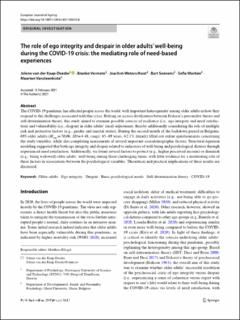| dc.description.abstract | The COVID-19 pandemic has affected people across the world, with important heterogeneity among older adults in how they respond to the challenges associated with this crisis. Relying on a cross-fertilization between Erikson’s personality theory and self-determination theory, this study aimed to examine possible sources of resilience (i.e., ego integrity and need satisfaction) and vulnerability (i.e., despair) in older adults’ (mal) adjustment, thereby additionally considering the role of multiple risk and protective factors (e.g., gender and marital status). During the second month of the lockdown period in Belgium, 693 older adults (Mage = 70.06, SD = 4.48, range: 65–89 years, 62.1% female) filled out online questionnaires concerning the study variables, while also completing assessments of several important sociodemographic factors. Structural equation modeling suggested that both ego integrity and despair related to indicators of well-being and psychological distress through experienced need satisfaction. Additionally, we found several factors to protect (e.g., higher perceived income) or diminish (e.g., being widowed) older adults’ well-being during these challenging times, with little evidence for a moderating role of these factors in associations between the psychological variables. Theoretical and practical implications of these results are discussed. | en_US |

